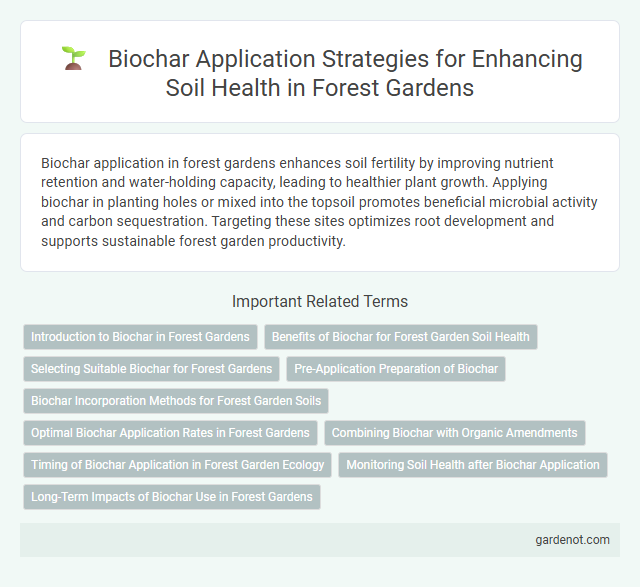Biochar application in forest gardens enhances soil fertility by improving nutrient retention and water-holding capacity, leading to healthier plant growth. Applying biochar in planting holes or mixed into the topsoil promotes beneficial microbial activity and carbon sequestration. Targeting these sites optimizes root development and supports sustainable forest garden productivity.
Introduction to Biochar in Forest Gardens
Biochar is a carbon-rich material produced through the pyrolysis of organic biomass, offering significant benefits for forest garden soil health. Its porous structure improves soil aeration, water retention, and nutrient availability, enhancing plant growth and resilience. Applying biochar in forest gardens promotes sustainable carbon sequestration, supporting long-term ecosystem productivity and soil fertility.
Benefits of Biochar for Forest Garden Soil Health
Biochar application in forest gardens enhances soil health by improving nutrient retention and increasing microbial activity. It boosts soil pH balance and water-holding capacity, promoting resilient root systems and reducing erosion. These benefits lead to sustainable growth, higher crop yields, and long-term forest garden productivity.
Selecting Suitable Biochar for Forest Gardens
Selecting suitable biochar for forest gardens involves evaluating feedstock types, biochar porosity, and nutrient content to enhance soil fertility and water retention. Hardwood-derived biochar with high surface area improves microbial activity and nutrient adsorption, promoting tree growth and understory plant health. Applying biochar tailored to specific soil conditions maximizes carbon sequestration and supports sustainable forest garden ecosystems.
Pre-Application Preparation of Biochar
Biochar application in forest gardens requires thorough pre-application preparation to ensure soil health and nutrient retention. It is essential to analyze soil pH, texture, and nutrient levels before incorporation to optimize biochar's benefits in improving water retention and microbial activity. Properly conditioning biochar by moistening or mixing with compost enhances its effectiveness and reduces initial nutrient immobilization in forest garden soils.
Biochar Incorporation Methods for Forest Garden Soils
Biochar incorporation methods for forest garden soils significantly impact nutrient retention and soil health. Techniques such as surface application followed by light tilling or mixing with organic mulch enhance microbial activity and improve water holding capacity. Selecting proper incorporation strategies tailored to specific soil types ensures optimal carbon sequestration and plant growth within forest garden ecosystems.
Optimal Biochar Application Rates in Forest Gardens
Optimal biochar application rates in forest gardens typically range from 5 to 20 tons per hectare, enhancing soil fertility, water retention, and microbial activity. Application should consider soil type, existing organic matter, and specific tree species to maximize growth and carbon sequestration benefits. Site-specific trials and gradual incorporation help determine the precise dosage for sustained ecosystem health and productivity.
Combining Biochar with Organic Amendments
Combining biochar with organic amendments in forest gardens enhances soil fertility by improving nutrient retention and microbial activity. Biochar's porous structure aids in water retention while organic materials supply essential nutrients and stimulate beneficial soil biota. This synergy leads to healthier plant growth and increased resilience against environmental stressors.
Timing of Biochar Application in Forest Garden Ecology
Applying biochar during the early stages of forest garden establishment maximizes soil nutrient retention and microbial activity essential for plant growth. Biochar incorporation before planting enhances water-holding capacity and supports root development in diverse perennial species. Timing biochar application during the dormant season also reduces nutrient leaching and promotes long-term soil fertility in forest garden ecosystems.
Monitoring Soil Health after Biochar Application
Monitoring soil health after biochar application in forest gardens involves tracking key indicators such as soil pH, nutrient levels, and microbial activity to assess improvements in soil fertility and structure. Regular soil testing and analysis of organic matter content help evaluate biochar's impact on enhancing water retention and reducing soil acidity. Implementing remote sensing techniques and in-field sensors provides real-time data for adaptive management of soil conditions following biochar treatment.
Long-Term Impacts of Biochar Use in Forest Gardens
Biochar application in forest gardens enhances soil fertility by improving nutrient retention and water-holding capacity over long periods. Its stable carbon structure contributes to increased soil organic matter, supporting diverse microbial communities essential for plant health. Long-term biochar use also aids in carbon sequestration, mitigating climate change while promoting sustainable forest garden productivity.
Biochar application site Infographic

 gardenot.com
gardenot.com